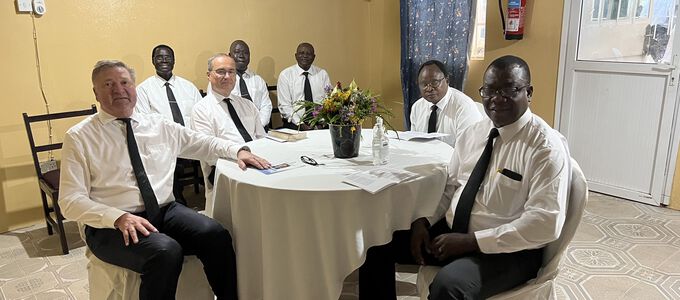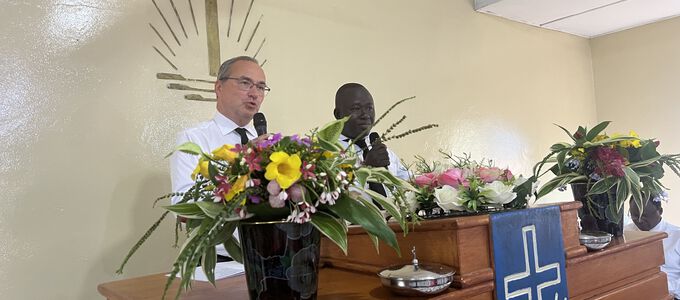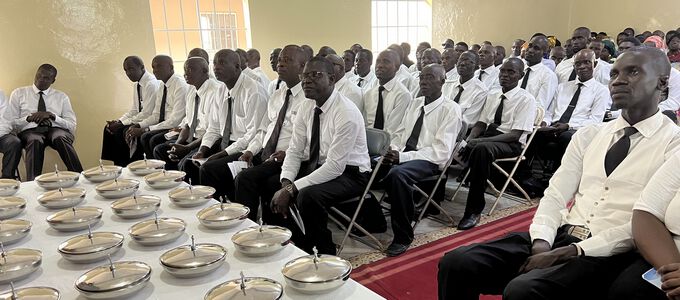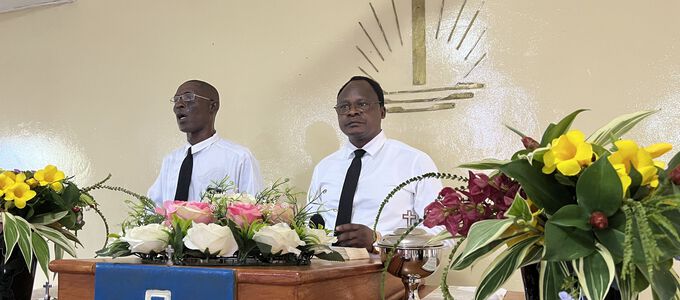God’s word in plain language
Faith, doctrine, preaching: everything is based on the Bible. That is why it is so important both for the ministers and members to know their Bible well. However, it cannot be read just like any other book. Here is a manual from a service by the Chief Apostle.
Comfort, strength, and blessing: some people expect miracles. But this is not how God works. “God wants to talk to human beings, and He wants them to listen to Him. And that is why the preaching in our Church is so important,” Chief Apostle Jean-Luc Schneider said on 22 September in Banjul, Gambia.
“Not every word spoken at the altar is God’s word.” The sermon is not perfect because it is delivered by imperfect human beings, the Chief Apostle said. But the Holy Spirit can provide us with the strength we need in spite of these imperfections.
“You need a good knowledge of the Bible.” For the Bible is the foundation of our faith, the Chief Apostle said. “So the ministers should know the Bible. The believers should also know the Bible. Otherwise, it is difficult to understand the meaning of the preaching.” Above all: “Reading the Bible gives comfort and wisdom from God.”
Not a book like any other
“You cannot read the Bible as you read any other book.” Because what has been written by inspiration of the Holy Spirit must also be read under the inspiration of the Holy Spirit, the Chief Apostle said. “Otherwise, it cannot be understood in the right manner.”
“This is exactly where the problem lies,” the Chief Apostle pointed out with reference to the Bible text that the divine service was based on: “You search the Scriptures, for in them you think you have eternal life; and these are they which testify of Me” (John 5: 39).
The scribes saw Holy Scripture as a collection of rules and laws. However: “Jesus said: that is not the true understanding of the Scriptures.” But: “If you are inspired by the Holy Spirit you know that all of Scripture testifies of Jesus Christ.”
Between heaven and earth
“That was at the time of Jesus,” the Chief Apostle said. “What about us today?” he asked, warning against misunderstanding the Scriptures.
- “The Bible cannot replace science.” For the Bible texts reflect the knowledge of the time they were written in. The authors, for example, thought that the sun revolved around the earth (Joshua 10: 12) and that the earth was flat (Revelation 7: 1).
- “The Bible cannot make decisions for you.” For: “God does not want to make decisions for us. The Holy Spirit tells us what we have to consider to make our decisions. But we have to decide ourselves.”
In this context, the Chief Apostle referred to an old adage: “The Bible does not tell us about heaven and earth, it tells us how to live on earth to enter into heaven.”
Understanding contradictions properly
Let us avoid making our decisions or justifying them based on an isolated passage in the Bible. On many points, the Bible’s texts say everything and its opposite, and everyone can find what suits them The Chief Apostle illustrated some of the contradictions in the Bible.
- Sometimes God wanted the people of Israel to fight, other times not. Sometimes Jesus wanted the disciples to go only to the Jews, other times He wanted them to also go to the Gentiles. “Imagine you open the Bible and find only one of these sentences.”
- In 1 Corinthians 7: 26–33, Paul recommends not marrying to please the Lord. But we read in 1 Timothy 4: 1–3 that those who advise believers not to marry are false teachers! So was Paul a false teacher?
- In 1 Timothy 2 it says that God desires all people to be saved. A few verses later it says that women who were childless could not be saved. That would mean: God wants the salvation of all, except women whom He does not allow to have children.
“So far our human understanding: this poses a huge problem.” But “God says: use the Holy Spirit in order to understand things. And to help you, I have sent the Apostles.” They have the mission and authority to interpret the Bible.
Examining messages properly
“When we read the Old Testament in the light of the Holy Spirit, what can we learn?” the Chief Apostle asked, answering: God’s love for us is unconditional. He is faithful and keeps all His promises. He expects us to believe in Him and trust Him. He expects us to love God and our neighbour. Our election is based on grace, not on our merits. It is a calling to serve Him.
And the messages from the New Testament: Jesus Christ is the Son of God, who came to earth. Salvation means eternal life and eternal fellowship with Christ and His own. All of humankind can be saved if they believe in Jesus Christ. Those who want to prepare for the return of Christ must be reborn out of water and Spirit, receive Holy Communion, and follow the teaching of the apostolate.
In summing up, the Chief Apostle said: “The Bible is truly a wonderful source of strength, comfort, and wisdom. We need to know the Bible. We need to read it. But we must also allow ourselves to be inspired by the Holy Spirit. The apostolate has been sent by Jesus to help us understand the Bible properly. And if we do, we will find everything in the Bible we need to obtain salvation.”
Article info
Author:
Date:
Keywords:
Andreas Rother
29.09.2022
Africa,
Chief Apostle,
Bible,
Divine service,
Doctrinal statements
















